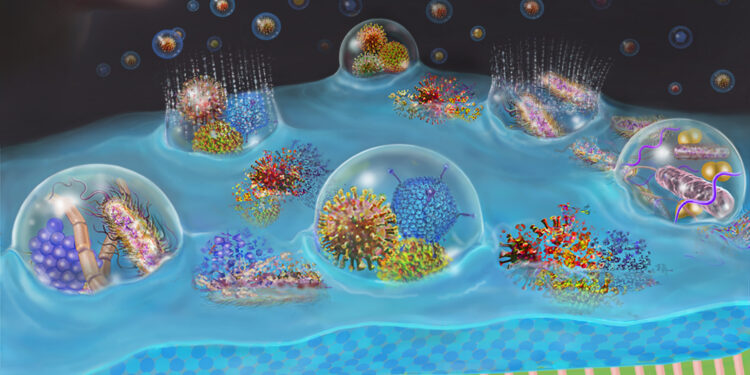Pathogens inhaled with respiratory droplets penetrate the nasal mucosa, causing respiratory infections. Brigham researchers have developed a pathogen capture and neutralization spray (PCANS), which coats the nasal cavity, captures large respiratory droplets, and serves as a physical barrier against a broad spectrum of viruses and bacteria, effectively neutralizing them. Credit: Randal McKenzie, McKenzie Illustrations.
A new study details how a nasal spray formulated by researchers at Brigham and Women’s Hospital may work to protect against viral and bacterial respiratory infections. Based on their preclinical studies, the researchers say the broad-spectrum nasal spray is long-lasting, safe, and, if validated in humans, could play a key role in reducing respiratory illness and protecting public health from new threats.
Their results are published in the journal Advanced materials.
“The COVID-19 pandemic has shown us what respiratory pathogens can do to humanity in a very short period of time. This threat has not gone away,” said co-senior author Jeffrey Karp, Ph.D., Distinguished Professor of Anesthesiology at Brigham and Women’s Hospital. “Not only do we have seasonal influenza to contend with, but now we have COVID-19 as well.”
Each year, influenza and COVID-19 infections cause thousands of deaths and hundreds of thousands of cases of serious illness. Milder infections cause significant discomfort, which can lead to missed work or school.
Vaccines for these viruses can be beneficial, but they are imperfect. Vaccinated people still get infected and spread the infection to others. Masks are also helpful, but they are also not perfect: they can leak, and many people wear them incorrectly or choose not to wear them at all.
“We need new, additional ways to protect ourselves and reduce disease transmission,” Karp said.
Most viruses enter our bodies through our noses. When we catch an airborne infection like the flu or COVID-19, we breathe out tiny droplets of fluid containing the pathogen. Healthy people around us breathe in these droplets containing the pathogen, which attach to the inside of their noses and infect the cells lining their nasal passages.
The pathogen replicates and can be released into the air when a sick person, whether they know it or not, sneezes, coughs, laughs, sings, or even just breathes.
The new study details the research team’s efforts to create a nasal spray to defend against airborne respiratory illnesses.
“The spray, called Pathogen Capture and Neutralizing Spray (PCANS) in the paper, was developed using ingredients from the FDA’s Inactive Ingredients Database (IID), which have already been used in approved nasal sprays, or from the FDA’s Generally Recognized As Safe (GRAS) list,” said co-senior author Nitin Joshi, Ph.D., assistant professor of anesthesiology at Brigham and Women’s Hospital.
“We have developed a drug-free formulation using these compounds to block germs in three ways: PCANS forms a gel-like matrix that traps respiratory droplets, immobilizes the germs and effectively neutralizes them, thereby preventing infection.”
The researchers performed the experiments detailed in the study in a laboratory setting. They did not study PCANS directly in humans. The researchers developed the formulation and studied its ability to capture respiratory droplets in a 3D-printed replica of a human nose. They showed that when sprayed into the replica of the nasal cavity, PCANS captured twice as many droplets as mucus alone.
“PCANS forms a gel, increasing its mechanical strength by a factor of a hundred, forming a strong barrier,” said lead author John Joseph, Ph.D., a former postdoctoral researcher at Brigham and Women’s Hospital. “It blocked and neutralized nearly 100% of all the viruses and bacteria we tested, including influenza, SARS-CoV-2, RSV, adenovirus, K pneumonia and many others.”
Experiments on mice showed that a single dose of PCANS nasal spray could effectively block infection with an influenza virus (PR8) at a dose 25 times higher than the lethal dose. Virus levels in the lungs were reduced by more than 99.99%, and inflammatory cells and cytokines in the lungs of animals treated with PCANS were normal.
“The formulation’s ability to inactivate a broad spectrum of pathogens, including the deadly PR8 influenza virus, demonstrates its high efficacy,” said co-senior author Yohannes Tesfaigzi, Ph.D., AstraZeneca Professor of Medicine in Respiratory and Inflammatory Diseases at Brigham and Women’s Hospital.
“In a rigorous study in a mouse model, prophylactic treatment with PCANS demonstrated exceptional efficacy, with treated mice showing complete protection, while the untreated group showed no such benefit.”
Although the study is limited by the lack of human studies on PCANS, it provides a solid foundation for future research to explore the full potential of PCANS in a broader context. The researchers are investigating whether PCANS can also block allergens, opening a potential new avenue for allergy relief.
More information:
Joseph, J et al. Towards a radically simple multimodal nasal spray for the prevention of respiratory infections, Advanced materials (2024). DOI: 10.1002/adma.202406348
Provided by Brigham and Women’s Hospital
Quote:Preclinical studies suggest drug-free nasal spray could prevent respiratory infections (2024, September 25) retrieved September 25, 2024 from
This document is subject to copyright. Apart from any fair dealing for the purpose of private study or research, no part may be reproduced without written permission. The content is provided for informational purposes only.



